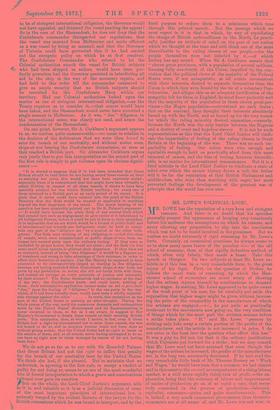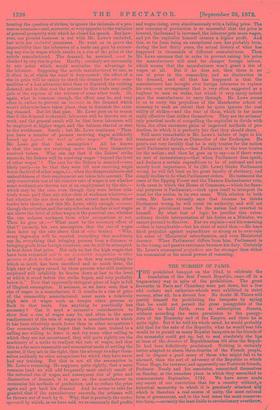MR. LONiTE'S POLITICAL LOGIC.
MR. LOWE has the reputation of a very keen and stringent reasoner. And there is no doubt that his speeches generally present the appearance of keeping very tenaciously
before his audience the assumptions on which he reasons, and
never allowing any proposition to slip into at e conclusion which was not to be found involved in the premisses. But we
confess we doubt extremely if rigid reasoning be Mr. Lowe's
forte. Certainly, on economical questions he always seems to us to show many more traces of the peculiar bias of the old school of economy, than of that rigidly deductive method, of which, often very falsely, they made a boast. Take this
speech at Glasgow. On two subjects at least Mr. Lowe ex- hibits in it this bias in a very remarkable form, to the great injury of his logic. First, on the question of Strikes, he follows the usual train of reasoning, by which the Man- chester school of economists are never weary of showing that the artisan injures himself by combinations to demand higher wages. In starting, Mr. Lowe appeared to be quite aware of the weak point of his case, for he carefully put aside the supposition that higher wages might be given without increas- ing the price of the commodity in the manufacture of which
the artisans are .engaged, .e., be put aside as practically
irrelevant to the movements now going on, the very condition of things which for the most part the artisans assume before a strike takes place. "If," said Mr. Lowe, "persons by striking only take away a certain portion of the profits of the manufacturer, and the article is not increased in price, I do not enter in the least into the question what effect this has."
It was a pity he did not, for that is the ordinary justification which Unionists put forward for a strike ; but we may remark tat Mr. Lowe need not have assumed that even though the wages of the artisan be increased, the profits of the manufacturer are, in the long run, necessarily decreased. If he had read the very remarkable little book of Mr. Thomas Brassey on "Work and Wages," he would have seen that a common, we had almost
said in this country the normal, accompaniment of a rising labour market, is a still more rapidly rising rata of profit,—the ex-
planation being that the economy of labour and improvement of modes of production go on at so rapid a rate, that every- body concerned in the process of production—labourer, capitalist, consumer—gains, and gains simultaneously. This is, indeed, a very ranch commoner phenomenon than theoretic economists are at all aware of, and Mr. Lowe was not wise, in
treating the question of strikes, to ignore the rationale of a pro- cess so common—and, moreover, so very apposite to the statistics of general prosperity with which he closed his speech. But how- ever, our present business is not with Mr. Lowe's excluded, but with his included premisses. He went on to prove the impossibility that the labourers of a trade can gain by extract- ing any rise in wages which results in a rise of the price of the article manufactured. The demand, he assumed, must be checked by any rise in price. Hardly; certainly not necessarily to any point which would neutralise the advantage to the labourer. Supposing the article manufactured be one, as it often is, of which the want is deep-rooted ; the effect of a rise in price will be rather to check the demand for other com- modities of a less attractive kind than to diminish the existing demand, and in that case the artisans in this trade may really gain at the expense of the artisans of some other trade. Or, again, what is common enough, the effect may be, and very often is, rather to prevent an increase in the demand which would otherwise•have taken place, than to diminish the exist- ing demand. But let that pass. Mr. Lowe goes on to reason that if the demand is checked, labourers will be thrown out of work, and the general result will be that fewer labourers will be employed at higher wages, and the balance starved or sent to the workhouse. Surely ; but Mr. Lowe continues, "Thus, you have a number of persons receiving wages artificially forced up beyond the level of other wages." Where did Mr. Lowe get that last assumption? All he knows is that the men are receiving more than they themselves received before. Who can say that if the Bakers' strike succeeds, the Bakers will be receiving wages "beyond the level of other wages" ? The case for the Bakers is asserted—very likely justly—to be that they were till now receiving wages below the level of other wages, i.e., when the disagreeableness and unhealthiness of their employment are taken into account. The only conceivable test of the relative rate of wages is not whether some workmen are thrown out of an employment by the rise,— which may be the case, even though they were before rela- tively worse paid than any other class of workmen whatever,— but whether the rise does or does not attract men from other trades into theirs ; and this Mr. Lowe, oddly enough, assumes, though the criterion, and the only criterion, whether or not wages are above the level of other wages, is the practical one, whether the rise seduces workmen from other occupations or not. Then he goes on :—" What must be the necessary effect of that ?" (namely, his own assumption that the rise of wages does force up the rate above that of other trades). "Why, every ingenuity will be exerted, everything that machinery can do, everything that bringing persons from a distance, or bringing goods from foreign countries, can do, will be attempted, to beat down that price. Not only so, but the high wages that have been extracted will be an irresistible temptation to other persons to flock to that trade; and in that way everything for which so much has been sacrificed and so much done, the high rate of wages earned by those persons who-still continue employed will infallibly be beaten down at last to the level at which it stood before the strike began, and very probably below it." Now that apparently stringent piece of logic is full of illogical assumption. It assumes, as we have seen, that a rise of wages in a manufacture, if it results in a rise of price of the commodity manufactured, must mean a relatively high rate of wages such as tempts other persons to flock to that trade. Can anything be practically less necessary ? Can it need a moment's 'consideration to show that a rise of wages may be, and often is, the mere readjustment of the rate of wages in a manufacture in which it has been relatively much lower than in other occupations ? Our economists always forget that before men trained to a calling are willing to leave it, and try some other calling to which they are not accustomed, they will quite rightly use the machinery of a strike to readjust the rate of wages, and that, this is a far more reasonable and economical mode of settling the matter, if they are in the right, than the attempt to adapt them- selves suddenly to other occupations for which they have never bad any training. But this is not all the assumption in Mr. Lowe's reasoning. He supposes, quite rightly, that a most common (and we will add frequently most useful) result of the enforced rise of wages, and consequent rise of price and diminution of demand, is to spur on the manufacturer to economise his methods of production, and so reduce the price again and get back his demand. And he seems to take for granted that if the manufacturer succeeds, the artisans will be thrown out of work by it. Why, that is precisely the modus operandi by which, as we have said, we so commonly find profits
and wages rising, even simultaneously with a falling price. The new economy of production is so successful that the price is lowered, thedemand is increased, the labourer gets more wages, and yet the capitalist himself obtains a higher profit. And this, so far from being an exceptional case, has probably been, during the last thirty years, the actual history of what has happened in thousands of different manufactures. Then Mr. Lowe assumes that in order to prevent raising his price the manufacturer will send for cheaper foreign labour, which means that the manufacturer won't grant a rise of
wages at all. But if he does not, then there is no rise of price in the commodity, and no diminution in the demand, and all that has happened is that the manufacturer has brought over foreign labourers to replace his- own,—an arrangement that is very often suggested as a bugbear to men on strike, but which it very rarely indeed pays the manufacturer to carry through. Mr. Lowe seems to us to carry the prejudices of the Manchester school of economy to such an extent that he quite ignores the real utility of strikes—and the fear of them, which is far more really effective than strikes themselves. They are the artisans' only practical mode of compelling the capitalist to divide with them the often enormous gains of improved methods of pro- duction, in which it is perfectly fair that they should share.
Still more remarkable is Mr. Lowe's failure of logic in his treatment of his duties as Chancellor of the Exchequer. He points out very forcibly that he is only trustee for the nation until Parliament speaks,—that Parliament is the true trustee for the nation ; and then he goes on to say—as if there were no sort of inconsistency—that when Parliament does speak, and declares a certain expenditure to be of national and not merely local importance, if he (Mr. Lowe) thinks Parliament wrong, he will fall back on his great faculty of obstinacy, and simply decline to do what Parliament orders. He instanced the cases of the Eppitig Forest and the Thames Embankment vote, both cases in which the House of Commons,—which for finan- cial purposes is Parliament,—took upon itself to interpret its trust for the nation in its own sense. With relation to both votes, Mr. Lowe virtually says that because he thinks Parliament wrong, he will resist its authority, and will act as if the provisional trust for the nation had reverted to himself. By what feat of logic he justifies this extra- ordinary double interpretation of his duties as a Minister, we cannot pretend to discover. But we explain—not his reasoning —that is inexplicable—but his state of mind thus :—He has a fixed prejudice against expenditure so strong as to over-rule his sense of Ministerial subordination, and even Ministerial decency. When Parliament differs from him, Parliament is in the wrong, and passive resistance becomes his duty. Certainly Mr. Lowe's economical prejudices are far stronger than either his economical or his moral powers of reasoning.



































 Previous page
Previous page